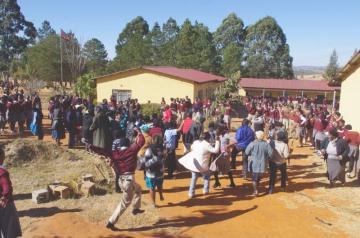SIBUSISO’S RETURN UNSETTLES UNIONS
 Shiselweni teachers being joined by pupils as they protested during the ‘Waya Waya’ strike last year.
Shiselweni teachers being joined by pupils as they protested during the ‘Waya Waya’ strike last year.
MBABANE – The news of the return to office of the Prime Minister, Sibusiso Barnabas Dlamini, has caused fear among workers and trade unions.
The Swaziland National Association of Teachers (SNAT) has said Dlamini’s return to office has brought them fear because of the hard-line that Dlamini’s government had adopted in the past against workers’ unions.
Dlamini has been described by the unions as having been harsh, and his return to office will warrant them to be careful in how they handle possible run-ins with his government.
The Trade Union Congress of Swaziland (TUCOSWA) has welcomed the PM back, but said the nature of government’s relationship with unions rests with him and how he treats the organisations. On the other hand, the Swaziland Democratic Party (SWADEPA) has said Dlamini’s return clearly meant their prayers were not answered as they did not want him as PM.
SNAT President Sibongile Mazibuko said as an organisation they feared the PM. She said they would be in a wait and see position. Mazibuko said their past with the prime minister and the past Cabinet had been very disruptive.
At one point, teachers’ salaries were cut by 33 per cent in 2012 during the indefinite strike action, which was dubbed ‘Waya Waya’.
“However, given our past we will be very cautious as we are afraid of some of the things we endured during his tenure in the past Parliament,” said Mazibuko. The disruptive episodes that Mazibuko referred to include the threat by government to fire teachers who took part in ‘Waya Waya’.
“As SNAT, we are preparing ourselves to be safe. Should incidents from the past be revived, we want to be safe as we fear what we went through. Our responsibility and duty is to prepare for the worst and how we are going to address our fears,” said the SNAT president.
Mazibuko said Dlamini’s return to office has revived memories of the aftermath of the ‘Waya Waya’ strike. The strike was eventually abandoned after the King summoned the nation to the Cattle Byre where presentations were made.
However, the Dlamini-led Cabinet maintained that the dismissed teachers should remaine fired, and the no-work-no-pay rule was applied, resulting in teachers’ salaries being cut.
However, the SNAT president said they were not anticipating a future with the elements of the past. She said in the past the PM was very harsh on them and naturally they were tempted to be prejudice. Mazibuko further evoked the occurrences of the past and stated that the teachers’ pay was minimised by 33 per cent while she also alleged that teachers were brutally assaulted by the police and also incarcerated. “It is this past we endured under him that we fear,” she said.
At the height of the ‘Waya Waya’ strike last year, SNAT took government to court to prevent it from replacing fired teachers.
SNAT was contesting the dismissal of teachers who were fired for taking part in the strike action. Government also implemented the no-work-no-pay rule on salaries of members of SNAT who fully participated in the strike.
This saw prominent SNAT member Dominic Nxumalo, the head teacher of St Mark’s High School, having a nett pay of E21.49. Non-striking teachers’ salaries were not slashed.
The strike was later joined by the Swaziland Transport and Allied Workers Union (STAWU), which saw a public transport halt nationwide.
Evidence of the sour relationship that existed with the previous government is the ongoing case where teachers took government to court for the salary deductions. Some of the 6 800 teachers who had their salaries deducted during the strike will have to give oral evidence in the matter.




 del.icio.us
del.icio.us Digg
Digg